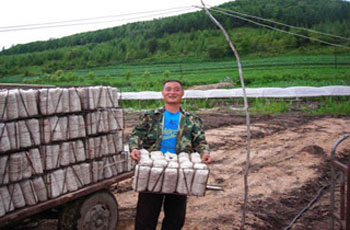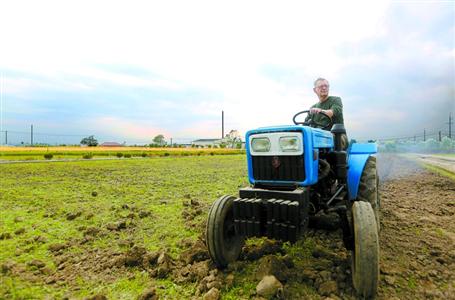The native chicken pecked out the road to wealth.
Under the leadership of Huang Yuping, party committee secretary of the municipal supply and marketing cooperative, the Shipan village village assistance working group came to Ren Rongguang's house of four groups in the village to visit the situation of raising chickens. According to Rong Guang, with the support of the municipal supply and marketing cooperative and the village support working group, he began to raise 200 native chickens in September this year. Now each chicken has five or six kilograms, and in another month, it can be out of the column, excluding feed and other costs. It is estimated that the net income of each chicken will reach 15 yuan. If all these chickens are sold out, the net income can reach about 3000 yuan. If they are fed three rounds a year, the net income can reach tens of thousands of yuan. Seeing the local chicken running under the forest, everyone felt that the poverty alleviation work in the past three months had finally made some small achievements.
Recalling that when I first arrived in Shipan Village, through a visit, I learned the main causes of poverty in the village, that is, there are many forests, little land, more young and middle-aged people going out, most of the people left behind in the village are the elderly, women and children, and there are no large farmers in the village, not to mention farmers' professional cooperatives. At the same time, in recent years, although the "two committees" of the village have not relaxed around the development of the "Mabian River-Muxi River 300000 mu high-quality tea industry belt" and planted more than 400 mu of tea trees in the village, the people still do not earn much money.
Centering on the topic of how to develop the economy under the forest and let ordinary people have a certain economic income, the working group conducted in-depth investigations for many times and found that the geographical environment and conditions of the village were suitable for raising chickens on a large scale, but judging from the previous breeding situation, the survival rate was not high when the scale was 10 cents. The main reason is that farmers are unwilling to put in too much energy when the breeding scale is small, and at the same time, at the initial stage of raising young chickens, they do not pay attention to scientific management, are unwilling to buy special feed for raising chickens, and feed directly with pig feed or corn, resulting in a higher mortality rate of illness. When the scale of raising is more than 500, most families do not have enough money and energy, and they are more willing to raise livestock and poultry with short cycle, high survival rate and wide market. In this regard, the working group organized and carried out the idea of using small-scale demonstration farmers to drive the development of the village's aquaculture industry: one is to select three poor households with feeding conditions and enthusiasm among the poor households as demonstration households; the other is to report to the municipal supply and marketing cooperatives and obtain its financial support to buy 500 chicken seedlings and distribute them to three demonstration households respectively, and at the same time send the special feed for raising chickens to their homes. The third is to organize these model households to conduct a centralized training.
Now, through more than 2 months of scientific and careful breeding, the survival rate of these 500 chicken seedlings is more than 95%, and the effect is very good. But then, after more farmers participate, they will face the problem of sales. To this end, the working group made a plan in advance: first, in mid-to-late December, farmers with breeding conditions and high enthusiasm for farming in the whole village will be gathered in the homes of demonstration households to allow more farmers to participate through their own viewing and demonstration households; second, when the conditions are ripe, large farmers will be United to form farmers' professional cooperatives. Third, the working group coordinates the village "two committees" and the exclusive agency to build a sales platform with outside sellers.
- Prev

"Internet +" hit the brand Northeast Auricularia auricula.
"Internet +" hit the brand Northeast Auricularia auricula.
- Next

Lang Jieshi, a cabbage farmer in Shanghai: the secret of a bumper harvest is hidden in the soil.
Lang Jieshi, a cabbage farmer in Shanghai: the secret of a bumper harvest is hidden in the soil.
Related
- A course of planting techniques and methods on how to grow carrots
- How to plant the latest tulips?
- Is it better to pick tea in the morning or in the afternoon? When is the best time for tea to be picked? what is the third or fifth tea?
- Launch Yuanxiao Happy combination Haocha + Tea Yuan healthy Taste
- Penghu Tourism "Fireworks 20 Parade with You"
- 2022 West Lake Happiness holds "Digital Revitalization Voucher" and draws iphone13 and laptop.
- Banqiao Fuzhou social houses are designed to change start-up combined with police elimination to create a safe and livable environment
- The convenient measure of "mechanical weeding" in Xinbei has been abused and the Agriculture Bureau has imposed heavy penalties on the illegal land consolidation.
- Changgeng University Joins Hands with Four Memory Factories to Rescue Memory Talent Shortage
- The list of Taiwan's top 100 MVP managers is listed by the Director-General of the Farmers' Association of Sanxia District.

